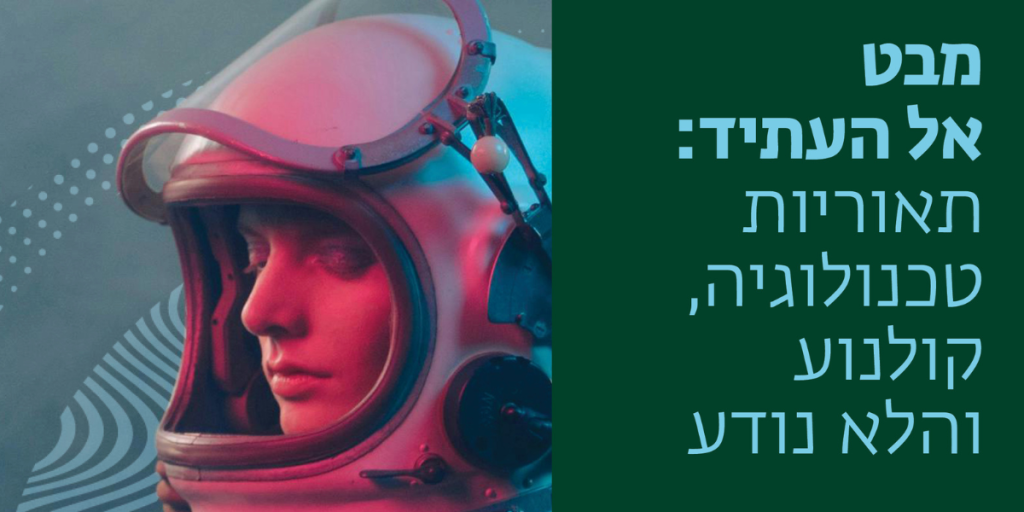מבט אל העתיד: תאוריות טכנולוגיה, קולנוע והלא נודע

תאריך
הכירו את קורסי הבחירה החדשים שלנו לסמסטר הקרוב!
המפנה הרגשי
The Emotional Turn
פרופ׳ חזקי שוהם
ימי ד׳, 16:00-16:00 (שנתי)
מה מקנה הקורס?
- היכרות עם תיאוריות של המפנה הרגשי
- קריאה ביקורתית של תיאוריות וכתיבה ביקורתית בעקבותן
- יכולת ניתוח קונקרטי של רגשות שונים ותפקידם בהיסטוריה, בחברה, בתרבות ובפוליטיקה האנושיות
- יישום תיאוריות במחקר מקרי מבחן מהסביבה הקרובה
- יישום כלים למחקר חברתי, תרבותי והיסטורי של רגשות בהקשרים שונים
תקציר הקורס
"המפנה הרגשי" הוא כינוי מטרייה כללי למקבץ של תיאוריות במדעי האדם השונים שבמרכזו ניתוח של רגשות כתופעה היסטורית, חברתית, תרבותית ופוליטית והכרה בתפקיד המרכזי שהם ממלאים בעיצוב חוויות, פרשנויות, מוסדות ויחסי כוח.
חוקרות וחוקרים מתחומים מגוונים — היסטוריה, סוציולוגיה, אנתרופולוגיה, ספרות, מגדר ועוד — החלו לבחון רגשות לא כתגובות פרטיות או פסיכולוגיות בלבד, אלא כתוצרים של הקשר היסטורי, שפה, ואינטראקציה חברתית. בצד זה, גוברת ההכרה בחשיבותם של רגשות כגורם מכריע בתהליכים תרבותיים, היסטוריים ופוליטיים, וגוברת ההכרה בצורך לנתח רגשות בנפרד, כמו גם בצורך לנתח את הקטגוריה "רגש" ואת תפקידה בחיי הפרט והחברה.
קורס זה יסקור את הספרות המרכזית שעומדת בבסיס המפנה הרגשי, תוך דיון בתיאוריות קלאסיות, מושגי יסוד, זירות מחקר חשובות, ורגשות ספציפיים, ובחינה של גישות ביקורתיות עכשוויות החושפות את אופני הפעולה של רגשות בהקשרים חברתיים משתנים.
לסילבוס המלא
שיעורים לדוגמה:
מהו המפנה הרגשי? // איך (לא) חוקרים רגשות? // רגשות בסיסיים // רגשות וטבע // רגשות ואנתרופולוגיה // רגשות וסוציולוגיה // רגשות והיסטוריה // שפה ורגשות // רגשות וקוגניציה // תורת רגשות // משטרי רגש // קהילות רגש // סגנון רגשי // ניהול רגשות // רגשות פוליטיים // רגשות ומגדר // חוק וענישה // אהבה // פחד, חרדה, אימה // שכול ואבל // גועל // מלנכוליה, עצב, דיכאון // כעס, זעם, טינה // כבוד // סולידריות
ביבליוגרפיה:
[Plamper, Jan. The History of Emotions. Oxford: Oxford University Press, 2015.]
Weber, Max. “Knies and the Problem of Irrationality.” In Roscher and Knies: The Logical Problems of Historical Economics, edited by Guy Oakes, 93–207. New York: Free Press, [1905] 1975.
James, William. “The Sentiment of Rationality.” In The Will to Believe and Other Essays in Popular Philosophy, 63–110. New York: Dover Publications, [1897] 1956.
Ekman, Paul. “An Argument for Basic Emotions.” Cognition and Emotion 6, nos. 3–4 (1992): 169–200. https://doi.org/10.1080/02699939208411068.
Reddy, William M. “Against Constructionism: The Historical Ethnography of Emotions.” Current Anthropology 38, no. 3 (1997): 327–351.
Hochschild, Arlie R. “Emotion Work, Feeling Rules, and Social Structure.” American Journal of Sociology 85, no. 3 (1979): 551–575.
Scheer, Monique. “Are Emotions a Kind of Practice (and Is That What Makes Them Have a History)? A Bourdieuian Approach to Understanding Emotion.” History and Theory 51, no. 2 (2012): 193–220.
Febvre, Lucien. “Sensibility and History: How to Reconstitute the Emotional Life of the Past.” Translated by K. Folca. In A New Kind of History: From the Writings of Febvre, edited by Peter Burke, 12–26. New York: Harper & Row, 1973.
Abu-Lughod, Lila, and Catherine A. Lutz. “Introduction: Emotion Discourse and the Politics of Everyday Life.” In Language and the Politics of Emotion, edited by Lila Abu-Lughod and Catherine A. Lutz, 1–23. Cambridge: Cambridge University Press, 1990.
Sarbin, Theodore R. “Emotions and Act: Rules and Rhetoric.” In The Social Construction of Emotion, edited by Rom Harré, 83–97. Oxford: Oxford University Press, 1998.
Stearns, Peter N., and Carol Z. Stearns. “Emotionology: Clarifying the History of Emotions and Emotional Standards.” The American Historical Review 90, no. 4 (1985): 813–836.
Reddy, William M. The Navigation of Feeling. New York: Cambridge University Press, 2001. Introduction, pp. 1–22.
Rosenwein, Barbara. “Problems and Methods in the History of Emotions.” Passions in Context 1 (2010): 1–32.
Gammerl, Benno. “Emotional Styles – Concepts and Challenges.” Rethinking History 16, no. 2 (2012): 161–175.
Wouters, Cas. “On Status Competition and Emotion Management: The Study of Emotions as a New Field.” Theory, Culture & Society 9, no. 1 (1992): 229–252.
Szanto, Thomas, and Jan Slaby. “Political Emotions.” In The Routledge Handbook of Phenomenology of Emotions, edited by Thomas Szanto and Hilge Landweer, 490–503. London and New York: Routledge, 2020.
Demertzis, Nicolas. “Introduction: Theorizing the Emotions-Politics Nexus.” In Emotions in Politics: The Affect Dimension in Political Tension, edited by Nicolas Demertzis, 1–16. Palgrave Macmillan, 2013.
Dubreuil, Benoît. “Punitive Emotions and Norm Violations.” Philosophical Explorations 13, no. 1 (2010): 35–50.
Ahmed, Sara. The Cultural Politics of Emotion. 2nd ed. Edinburgh: Edinburgh University Press, 2014. http://www.jstor.org/stable/10.3366/j.ctt1g09x4q
אווה אילוז, האוטופיה הרומנטית: בין אהבה לצרכנות, תרגום – תמר עמית (חיפה: אוניברסיטת חיפה וזמורה-ביתן, 2002), עמ' 83-15.
Bourke, Joanna. “Fear and Anxiety: Writing about Emotion in Modern History.” History Workshop Journal 55, no. 1 (2003): 111–133. Oxford University Press.
Tudor, Andrew. “A (Macro) Sociology of Fear?” The Sociological Review 51, no. 2 (2003): 238–256. Wiley-Blackwell.
Stearns, Peter N. Revolutions in Sorrow: The American Experience of Death in Global Perspective. Boulder, CO: Westview Press, 2008.
Miller, William Ian. The Anatomy of Disgust. Harvard University Press, 1997.
Flatley, Jonathan. Affective Mapping: Melancholia and the Politics of Modernism. Cambridge, MA: Harvard University Press, 2008.
Oliver, Kelly. “Shame, Depression, and Social Melancholy.” Sophia 59, no. 1 (2020): 31–38.https://doi.org/10.1007/s11841-020-00771-y
Barbalet, Jack. Emotion, Social Theory, and Social Structure: A Macrosociological Approach. Cambridge: Cambridge University Press, 1998. See chapter 7.
אורית קמיר, שאלה של כבוד: ישראליות וכבוד האדם. ירושלים: כרמל, 2004, בעיקר עמ' 42-19.
Collins, Randall. “Emotional Energy as the Common Denominator of Rational Action.” Rationality and Society 5, no. 2 (1993): 203–230.
תאריך עדכון אחרון : 19/06/2025



